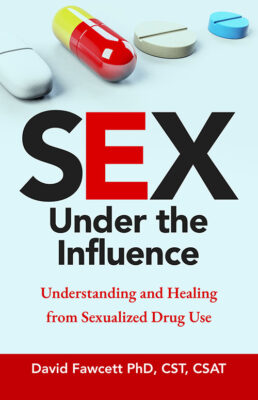Dr. David Fawcett
Unfortunately for sex addicts seeking recovery, triggers are inevitable, especially because sex and drugs are so deeply woven into our consumer culture. In today’s world, anyone – anywhere and at any time – can be aroused by sexual desire. This could be driving past sexy billboard after sexy billboard, seeing someone showing too much skin at the mall, sitting in the stands at a children’s soccer game, picking up a magazine at a friend’s house, hanging out at a neighborhood party, attending a work event, walking the dog, going to a movie, exercising, sitting at home watching TV, driving through a neighborhood, etc.
When drug use and sexual fantasies merge with sexual behavior, these triggers are multiplied. This means that the number and variety of triggers are endless, and there is little you can do about them other than to understand how it feels to be triggered and choose to implement healthier (non-addictive) coping methods when necessary.
When sex addicts are triggered, it is important that they have a recovery toolbox that they can use in moments of crisis. After all, utilizing one or more healthy coping mechanisms (recovery tools) is the only effective way to shorten the cycle of addiction. The first and most obvious tool is the “Cycle Plan.” Other helpful tools include, but are not limited to, the following:
- Group Therapy and 12-Step Recovery Meetings: To maintain long-term recovery, sex addicts need places where they can talk openly and honestly about their addictive behaviors without worrying about what others will say about them—including when, where, why, and how they get triggered. This is even more true when they are triggered and working to stop the cycle of addiction. By far the most accessible safe (compassionate, nonjudgmental, relatively private) place to do this is before, during, and after a group therapy or 12-step recovery meeting. In short, one of the most powerful tools in the toolbox is to talk to another recovering addict. If there is no meeting at the time, the addict can open their group’s phone list and call anyone on it. Having this list of phone numbers of supportive friends in recovery handy is critical when the addict has the urge to act out, needs immediate help in a crisis, or simply wants support and guidance from someone who speaks the language of recovery.
 stop: This is an acronym for Hungry, Angry, Lonely, Tired. Any of these simple situations can cause an addict to vent more easily than usual. Let’s face it, even healthy, non-addicted people tend to engage in behaviors they may later regret when their judgment is clouded by hunger, anger, loneliness, or exhaustion. The trick here is for addicts to recognize and address these needs when they arise, rather than simply lumping them in with all the other forms of emotional discomfort they have been trying to avoid through their addictive behaviors. Therefore, especially in early recovery, addicts must learn to stop and ask themselves, “When was the last time I ate? Did I get enough sleep last night? Is there some conflict in my life that needs to be resolved? Would spending a few minutes talking to someone who understands make me feel better?” Often, a short nap, a piece of candy, or a five-minute phone conversation will go a long way toward reducing the urge to vent.
stop: This is an acronym for Hungry, Angry, Lonely, Tired. Any of these simple situations can cause an addict to vent more easily than usual. Let’s face it, even healthy, non-addicted people tend to engage in behaviors they may later regret when their judgment is clouded by hunger, anger, loneliness, or exhaustion. The trick here is for addicts to recognize and address these needs when they arise, rather than simply lumping them in with all the other forms of emotional discomfort they have been trying to avoid through their addictive behaviors. Therefore, especially in early recovery, addicts must learn to stop and ask themselves, “When was the last time I ate? Did I get enough sleep last night? Is there some conflict in my life that needs to be resolved? Would spending a few minutes talking to someone who understands make me feel better?” Often, a short nap, a piece of candy, or a five-minute phone conversation will go a long way toward reducing the urge to vent.- Bookends: Sometimes an addict’s addictive behavior is triggered unexpectedly. Sometimes, an addiction trigger can be spotted days in advance. For example, attending a social event where people dress up and drink alcohol is an obvious potential trigger for most addicts. Knowing this, they can schedule a call to a therapist, 12-step sponsor, accountability partner, or other supportive person in recovery at the end of the event. In the pre-call, the addict commits to sobering up and discusses a plan to avoid relapse in this particular situation. Afterward, the post-call provides an opportunity to discuss what happened, what feelings arose, and what the addict may need to do differently next time.
- grateful: Sex addicts have often numbed themselves with sexual fantasies and behaviors for so long that they’ve forgotten how to experience emotions in a healthy way—especially uncomfortable emotions like anxiety, depression, shame, fear, and more. Sometimes, especially early in the recovery process, they can become so overwhelmed by these feelings that they forget what’s right in their lives. A great way to combat this kind of bad thinking is to make a gratitude list. Writing a ten-item gratitude list almost always offsets nearly all of the triggers and stops the cycle of addiction. For some addicts, every gratitude list begins the same way: “I’m grateful to be sober at this moment.” A side benefit of gratitude is that it promotes happiness. As Brene Brown points out in her book, Be boldgratitude and joy are inseparable.[i] After conducting thousands of in-depth interviews on the causes and potential factors of happiness, Dr. Brown discovered one major difference between happy people and unhappy people. It’s that happy people are grateful for what they have. Period. People who are grateful for what they have tend to focus on their strengths rather than their weaknesses. They are also more hopeful, less stressed, less likely to wallow in shame and depression, and more likely to recover from addiction.
- Three Seconds Rule: Sex addicts and sex drug users cannot control the thoughts that pop up in their minds. What they can control is how they deal with those thoughts once they become aware of them. For example, after recognizing an unwanted and addictive thought or fantasy, they can give themselves up to three seconds to redirect their attention to something else. Often, once they become aware of the triggering thought, they will give it to their higher power, asking for the thought to be banished. This process is effective and works well, even for addicts who struggle with the concept of God/higher power. Doing something, anything, to get rid of the unwanted thought or fantasy almost always works. Sometimes, the three-second rule will only help for a moment. During difficult times, unwanted addictive thoughts may appear almost constantly in the addict’s mind – one unwanted fantasy is banished, and a moment later, another one pops up. When this happens, the three-second rule can be used over and over again. This can actually be a boon, as regularly practicing the three-second rule will inevitably reduce the power of addictive triggers, as long as those triggers are not reinforced/rewarded through use or action.
Obviously, these five tools are not exhaustive. Journaling, written 12-step work, consistently reaching out to other recovering people, 12-step sponsorship (giving and receiving), reading recovery-related literature, changing old habits, developing healthy hobbies, prayer, meditation, and simply thinking are just a few of the hundreds of other tools sex addicts can rely on to combat their addictive patterns.
Before I go on, I want to pause and reiterate a particularly powerful statement from the above information. When a sex addict is triggered, the most powerful tool they have is their willingness to let another recovering addict know that they are struggling. Therefore, those who do best in recovery are those who are willing to commit themselves wholeheartedly to the sober community—making friends, answering and making recovery-related calls, fully participating in their 12-step meetings and recovery support groups, and offering to be of service to other recovering addicts.
refer to
[i] Brown, B. (2012). Bravely Presenting: How Being Vulnerable Changes the Way We Live, Love, Parent, and Lead. London: Penguin Books.
* * * * * * * * * *
If you or someone you love is struggling with sex, pornography, or drug/sex addiction, Seeking Integrity can help. In addition to inpatient rehab, we offer low-cost online workgroups for newly recovered male sex addicts and male pornography addicts. Click here for information about our sex addiction workgroup. Click here for information about our pornography addiction workgroup.


 Anal Beads
Anal Beads Anal Vibrators
Anal Vibrators Butt Plugs
Butt Plugs Prostate Massagers
Prostate Massagers
 Alien Dildos
Alien Dildos Realistic Dildos
Realistic Dildos
 Kegel Exercisers & Balls
Kegel Exercisers & Balls Classic Vibrating Eggs
Classic Vibrating Eggs Remote Vibrating Eggs
Remote Vibrating Eggs Vibrating Bullets
Vibrating Bullets
 Bullet Vibrators
Bullet Vibrators Classic Vibrators
Classic Vibrators Clitoral Vibrators
Clitoral Vibrators G-Spot Vibrators
G-Spot Vibrators Massage Wand Vibrators
Massage Wand Vibrators Rabbit Vibrators
Rabbit Vibrators Remote Vibrators
Remote Vibrators
 Pocket Stroker & Pussy Masturbators
Pocket Stroker & Pussy Masturbators Vibrating Masturbators
Vibrating Masturbators
 Cock Rings
Cock Rings Penis Pumps
Penis Pumps
 Wearable Vibrators
Wearable Vibrators Blindfolds, Masks & Gags
Blindfolds, Masks & Gags Bondage Kits
Bondage Kits Bondage Wear & Fetish Clothing
Bondage Wear & Fetish Clothing Restraints & Handcuffs
Restraints & Handcuffs Sex Swings
Sex Swings Ticklers, Paddles & Whips
Ticklers, Paddles & Whips







 stop: This is an acronym for Hungry, Angry, Lonely, Tired. Any of these simple situations can cause an addict to vent more easily than usual. Let’s face it, even healthy, non-addicted people tend to engage in behaviors they may later regret when their judgment is clouded by hunger, anger, loneliness, or exhaustion. The trick here is for addicts to recognize and address these needs when they arise, rather than simply lumping them in with all the other forms of emotional discomfort they have been trying to avoid through their addictive behaviors. Therefore, especially in early recovery, addicts must learn to stop and ask themselves, “When was the last time I ate? Did I get enough sleep last night? Is there some conflict in my life that needs to be resolved? Would spending a few minutes talking to someone who understands make me feel better?” Often, a short nap, a piece of candy, or a five-minute phone conversation will go a long way toward reducing the urge to vent.
stop: This is an acronym for Hungry, Angry, Lonely, Tired. Any of these simple situations can cause an addict to vent more easily than usual. Let’s face it, even healthy, non-addicted people tend to engage in behaviors they may later regret when their judgment is clouded by hunger, anger, loneliness, or exhaustion. The trick here is for addicts to recognize and address these needs when they arise, rather than simply lumping them in with all the other forms of emotional discomfort they have been trying to avoid through their addictive behaviors. Therefore, especially in early recovery, addicts must learn to stop and ask themselves, “When was the last time I ate? Did I get enough sleep last night? Is there some conflict in my life that needs to be resolved? Would spending a few minutes talking to someone who understands make me feel better?” Often, a short nap, a piece of candy, or a five-minute phone conversation will go a long way toward reducing the urge to vent.









